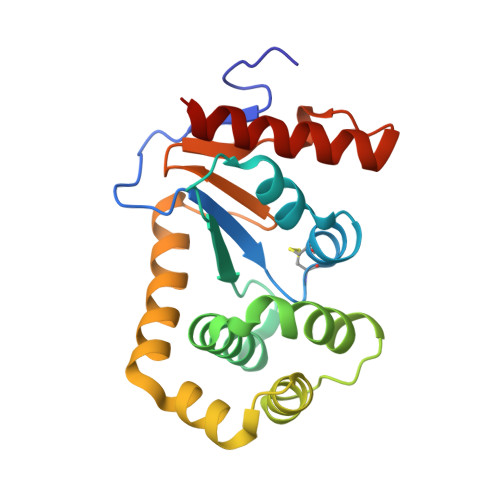Application of Fragment-Based Screening to the Design of Inhibitors of Escherichia coli DsbA.
Adams, L.A., Sharma, P., Mohanty, B., Ilyichova, O.V., Mulcair, M.D., Williams, M.L., Gleeson, E.C., Totsika, M., Doak, B.C., Caria, S., Rimmer, K., Horne, J., Shouldice, S.R., Vazirani, M., Headey, S.J., Plumb, B.R., Martin, J.L., Heras, B., Simpson, J.S., Scanlon, M.J.(2015) Angew Chem Int Ed Engl 54: 2179-2184
- PubMed: 25556635
- DOI: https://doi.org/10.1002/anie.201410341
- Primary Citation of Related Structures:
4WET, 4WEY, 4WF4, 4WF5 - PubMed Abstract:
The thiol-disulfide oxidoreductase enzyme DsbA catalyzes the formation of disulfide bonds in the periplasm of Gram-negative bacteria. DsbA substrates include proteins involved in bacterial virulence. In the absence of DsbA, many of these proteins do not fold correctly, which renders the bacteria avirulent. Thus DsbA is a critical mediator of virulence and inhibitors may act as antivirulence agents. Biophysical screening has been employed to identify fragments that bind to DsbA from Escherichia coli. Elaboration of one of these fragments produced compounds that inhibit DsbA activity in vitro. In cell-based assays, the compounds inhibit bacterial motility, but have no effect on growth in liquid culture, which is consistent with selective inhibition of DsbA. Crystal structures of inhibitors bound to DsbA indicate that they bind adjacent to the active site. Together, the data suggest that DsbA may be amenable to the development of novel antibacterial compounds that act by inhibiting bacterial virulence.
- Medicinal Chemistry, Monash Institute of Pharmaceutical Sciences, Monash University, 381 Royal Parade, Parkville, VIC 3052 (Australia) http://www.pharm.monash.edu.au.
Organizational Affiliation:


















